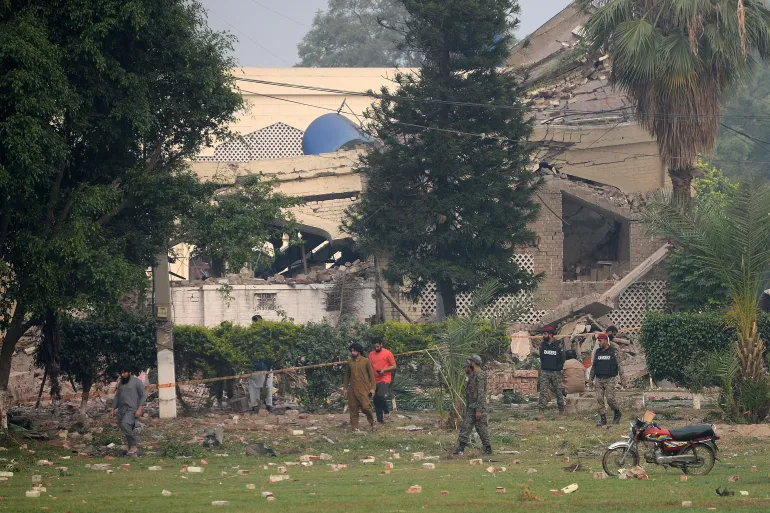In a chilling proclamation, the World Health Organization (WHO), an eminent UN organization headquartered in Geneva, and the UN Children’s Fund (UNICEF), sounded the alarm that numerous nations are now grappling with cholera outbreaks. Not only are the reported cases spiraling out of control, but the prognosis for afflicted individuals has taken a sharp nosedive compared to a decade ago.
“The pandemic is mercilessly claiming the lives of the impoverished right before our very eyes,” declared Jerome Pfaffmann Zambruni, the indomitable leader of UNICEF’s Public Health Emergency unit, with an air of solemnity.
Concurring with this bleak assessment, WHO’s data paints a disheartening picture. By the same time last year, a distressing tally of 15 countries had already fallen victim to cholera’s wrath. However, as we approach the middle of May this year, an alarming surge in figures has emerged, with an already staggering count of 24 countries documenting cases. Moreover, the anticipated escalation in cholera incidents due to seasonal shifts leaves no doubt that this unsettling trend will persist.
The reemergence of cholera, an ailment that once haunted the annals of history, is a grim reminder of the disparities in our world. It ruthlessly preys on the most vulnerable, wreaking havoc on those who are least equipped to withstand its assault. The dire consequences of this resurgence serve as a potent testament to the urgent need for decisive action.
Cholera’s resurgence is an affront to progress and an indictment of our collective failure to safeguard the well-being of the marginalized. It is an abomination that this archaic disease has resurfaced, obliterating lives and shattering communities with a vengeance. The stark reality is that our most cherished principles of equality and social justice have been laid bare, exposing the devastating consequences of persistent neglect.
As the number of afflicted nations continues to rise unabated, it becomes abundantly clear that mere rhetoric will not suffice. The time for meaningful intervention and effective strategies is upon us. It is incumbent upon the international community to muster the necessary resources, expertise, and determination to halt cholera’s remorseless advance.
The fight against cholera demands a comprehensive approach that spans borders and transcends political divides. By fortifying healthcare systems, ensuring access to clean water and sanitation facilities, and bolstering preventive measures, we can disrupt the chain of transmission and provide a glimmer of hope to those ensnared by this ruthless adversary.
To combat cholera’s resurgence, a united front is essential. We must harness the power of collaboration, mobilizing governments, organizations, and individuals to confront this grave threat head-on. Only through concerted efforts, guided by an unwavering commitment to protect the vulnerable, can we extinguish the flames of this resurgent scourge.
Let us not be complacent in the face of cholera’s resurgence. It is a call to action that demands our unwavering resolve. By mustering our collective strength and channeling it into tangible solutions, we can rewrite the narrative of this disease. Together, we have the power to relegate cholera to the annals of history once and for all, ensuring a brighter and healthier future for all humankind.
“Despite strides in curbing this affliction during past decades, we find ourselves teetering on the precipice of regression.”
Startling statistics from the UN health agency reveal that a staggering one billion individuals in 43 nations stand on the precipice of cholera’s menacing grip, with young children under five at heightened vulnerability. The ghastly specter of cholera’s disproportionately high mortality rate looms ominously, with Malawi and Nigeria reporting case fatality rates as alarmingly high as three percent this year, surpassing the tolerable threshold of one percent.
The dire consequences of this virulent disease are most acutely felt in Southeastern Africa, where infections run rampant through the veins of Malawi, Mozambique, South Africa, Tanzania, Zambia, and Zimbabwe. The emergence of this pervasive outbreak can be traced back to the calamitous aftermath of Cyclone Freddy, whose wrath ravaged the region between February and March, upending the lives of 800,000 people in Malawi and Mozambique, tearing apart communities, and shattering the foundations of healthcare.
Trapped within the confines of vulnerability, these marginalized populations find themselves ensnared in the perilous clutches of cholera—a wholly preventable malady that thrives in the wake of torrential rains and devastating floods.
This unfolding crisis bears witness to the lethal combination of climate change, woeful underinvestment in water, sanitation, and hygiene infrastructure, and, in some instances, the harrowing backdrop of armed conflict. It is an unholy trinity that has paved the way for the pernicious spread of this malaise, as acknowledged by the two UN agencies tasked with combating its insidious advance.
While vaccines do exist as a bulwark against cholera’s onslaught, the current supply falls woefully short of meeting the mounting demand. A disheartening disparity emerges when we examine the global landscape, with a staggering request for 18 million vaccine doses reverberating across nations, while a mere eight million doses have materialized on the frontlines of defense.
The inadequacy of vaccine provision represents a disheartening reality that compels urgent action on a global scale. To turn the tide against cholera’s encroachment, concerted efforts must be marshaled to bridge this alarming gap. It is incumbent upon world leaders, stakeholders, and philanthropic organizations to mobilize resources, galvanize support, and surmount the hurdles that impede the equitable distribution of life-saving vaccines.
We cannot afford to let this silent assassin decimate communities and snuff out lives with impunity. The time has come for decisive action, where words are transformed into tangible measures that will quell the tremors of this impending catastrophe.
International collaboration and cooperation lie at the heart of an effective response. By forging robust alliances, pooling expertise, and enhancing the capacity of healthcare systems in at-risk regions, we can staunch the flow of this relentless tide. Investment in resilient infrastructure, bolstered by cutting-edge research and innovation, must become the cornerstone of our battle plan.
Cholera’s resurgence is a clarion call to rectify the systemic inequalities that perpetuate its grip on vulnerable communities. It demands a comprehensive approach that addresses the multifaceted challenges at play—climate change, water and sanitation deficiencies, and the specter of conflict. Only by confronting these interconnected issues head-on can we dismantle the barriers that hinder progress and pave the way for a cholera-free world.
“Instantaneous panaceas elude us,” remarked Gray, emphasizing that a swift upsurge in production cannot be conjured overnight. The ambitious objective of doubling vaccine production by 2025, while commendable, will fall short if the prevailing trajectory persists. Vaccines, albeit indispensable, are but one tool in the arsenal against cholera. Our foremost priority must be an enduring commitment to long-term investments in water sanitation—a keystone of effective prevention,” he asserted.
UNICEF joined the chorus, underscoring the imperative for both far-sighted investments and immediate action to fortify water systems, guaranteeing universal access to clean water, sanitation, and preserving human dignity. The urgency of the situation cannot be overstated.
In response to the escalating cholera menace, the WHO is spearheading a robust 12-month Strategic Preparedness, Response, and Readiness Plan, necessitating a budget of $160 million. Simultaneously, UNICEF has issued a resounding Call to Action, urging an allocation of $480 million.
Don’t forget to Subscribe our channel & Press Bell Icon.
This comprehensive cholera response blueprint will extend its protective embrace over 40 nations ensnared in acute crisis. It encompasses crucial components such as streamlined coordination, meticulous infection surveillance and prevention measures, widespread vaccination campaigns, effective treatment protocols, and a comprehensive focus on water, sanitation, and hygiene practices.
The stage is set for a united front against this relentless adversary. Through collective action, we can erect a formidable barrier against cholera’s encroachment, shielding vulnerable populations from its deadly grip. Heightened coordination among nations, information sharing, and best practices will fortify our defenses and provide a solid foundation for a sustained counterattack.
Investments in state-of-the-art technology and innovation, in conjunction with robust surveillance systems, will form the bedrock of our efforts. Proactive monitoring, early detection, and rapid response mechanisms will enable us to stay one step ahead in this battle for survival.
However, financial resources alone cannot guarantee victory. The onus lies on governments, international organizations, and civil society to cultivate a culture of collective responsibility. By fostering a sense of ownership, empowering local communities, and integrating their invaluable knowledge and expertise, we can forge a path toward lasting change.
Moreover, education and awareness campaigns must take center stage, dispelling myths, combating misinformation, and equipping individuals with the knowledge to safeguard themselves and their communities. The fight against cholera is not confined to the realm of medicine and infrastructure; it is a battle that demands a holistic approach, embracing social, cultural, and behavioral transformations.
In our pursuit of a cholera-free world, let us not lose sight of the profound impact we can have on the lives of millions. Each life saved, each community protected, serves as a testament to our collective resilience and commitment. The time for action is now.
As the winds of change blow, we must rise to the occasion, undeterred by the daunting challenges that lie before us. Let us summon the strength to confront the insidious advance of cholera, armed with the resolve to overcome adversity and forge a brighter future for generations to come.
Together, we possess the power to script a different narrative—a story of triumph over tragedy, of resilience prevailing against all odds. Let us seize this opportunity, harnessing the might of our collective will, to turn the tide and consign cholera to the annals of history. The journey will be arduous, but the destination— a world free from the grip of cholera— is within our reach.
In conclusion, the resurgence of cholera is a grave concern that demands immediate attention and action. The warning sounded by UN health experts serves as a wake-up call to the global community, reminding us that this 19th-century disease is far from eradicated. With increasing outbreaks and worsening outcomes for patients, it is clear that we are facing a critical situation.
The impact of cholera is particularly devastating for the poor and vulnerable populations, with children under five being especially at risk. The high mortality ratio and the rising number of cases in different countries raise alarming red flags. The situation in Southeastern Africa, compounded by the aftermath of Cyclone Freddy, highlights the vulnerability of communities affected by heavy rains and floods.
Multiple factors contribute to the spread of cholera, including climate change, inadequate investment in water and sanitation services, and even armed conflict in some areas. While vaccines exist, their availability falls short of the growing demand. It is crucial to not only increase vaccine production but also prioritize long-term investments in water sanitation as the primary solution.
The World Health Organization (WHO) and UNICEF have called for urgent action and investment to combat cholera. The launch of a comprehensive Strategic Preparedness, Response, and Readiness Plan, alongside the Call to Action, demonstrates the commitment to address the crisis. The plan encompasses various aspects, from coordination and infection surveillance to vaccination, treatment, and water sanitation and hygiene measures.
Addressing the cholera threat requires a concerted effort from governments, organizations, and individuals worldwide. It is a complex challenge that demands both immediate and long-term solutions. By investing in clean water access, sanitation infrastructure, and hygiene practices, we can create a foundation for preventing the spread of cholera and safeguarding public health.
The time to act is now. Adequate funding, resources, and collaboration are essential to effectively respond to the growing crisis. By working together, we can confront cholera’s resurgence and protect the lives of the most vulnerable. Let us heed the warning, mobilize our efforts, and strive for a future where cholera becomes a relic of the past.
Subscribe our website for latest updates:
https://republicpolicy.com/shop/
Read More
















